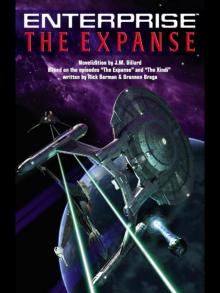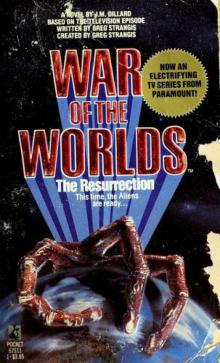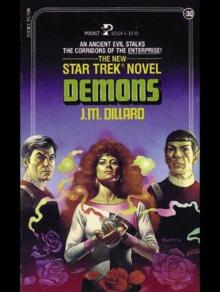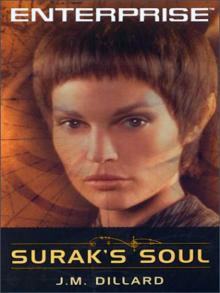- Home
- J. M. Dillard
Bloodthirst
Bloodthirst Read online
Thank you for downloading this Pocket eBook.
* * *
Join our mailing list and get updates on new releases, deals, bonus content and other great books from Simon & Schuster.
CLICK HERE TO SIGN UP
or visit us online to sign up at
eBookNews.SimonandSchuster.com
STAR TREK®
BLOODTHIRST
THE NEW NOVEL BY
J.M. DILLARD
POCKET BOOKS
This book is a work of fiction. Names, characters, places and incidents are either the product of the author’s imagination or are used fictitiously. Any resemblance to actual events or locales or persons, living or dead, is entirely coincidental.
An Original Publication of POCKET BOOKS
POCKET BOOKS, a division of Simon & Schuster Inc.
1230 Avenue of the Americas
New York, NY 10020
www.SimonandSchuster.com
Visit us on the World Wide Web:
http://www.SimonSays.com/st
http://www.startrek.com
Copyright © 1990 by Paramount Pictures. All Rights Reserved.
STAR TREK is a Registered Trademark of Paramount Pictures.
This book is published by Pocket Books, a division of Simon & Schuster Inc, under exclusive license from Paramount Pictures.
All rights reserved, including the right to reproduce this book or portions thereof in any form whatsoever. For information address Pocket Books, 1230 Avenue of the Americas New York, NY 10020
ISBN: 0-7434-1988-X
ISBN-13: 978-0-7434-1988-8
eISBN-13: 978-0-7434-1988-8
POCKET and colophon are registered trademarks of Simon & Schuster Inc.
Table of Contents
Prologue
Chapter 1
Chapter 2
Chapter 3
Chapter 4
Chapter 5
Chapter 6
Chapter 7
Chapter 8
Chapter 9
Chapter 10
Chapter 11
Chapter 12
Chapter 13
Chapter 14
Chapter 15
Chapter 16
Epilogue
Excerpt
Look for STAR TREK fiction from Pocket Books
Acknowledgments
Back in 1985, when Mindshadow was at the bottom of an editorial slushpile and Demons was a mere twinkle in my eye, I lived under the mistaken notion that I was the only Star Trek fan in the entire Washington, D.C., metropolitan area.
Hoo boy, was I wrong.
It was Liz Clark who got me (trembling and unsure) to my first Star Trek convention. Liz used to work at a local bookstore. It was she who introduced me to Ann Crispin at ClipperCon 1986. As Ann shook my hand, I think I stammered something about enjoying Yesterday’s Son, but I don’t remember much except that I was sure Ann thought me a total idiot. But to show you the type of person Crispin is, she went straight to the dealers’ room and bought a copy of my book, and had me sign it for her.
What can you say about such a generous person? From there, Ann has helped me to get onto panels at other conventions, introduced me to publishers, and thrown out literally thousands of ideas when I was mired deep in a plotting problem. (As a mutual friend of ours says, Ann always has eleven ideas before breakfast.)
She also gave me advice on getting an agent. Hers was Merrilee Heifetz, and I’m glad to say that Merrilee is now my agent, too. Besides being an incredibly pleasant person, Merrilee is the type of agent who goes beyond the call of duty, and I’d like to thank her here.
But back to Ann Crispin. Not only did she introduce me to Merrilee, she introduced me to all the wonderful members of the Whileaway Writers Co-op:
Debby Marshall, talented writer and quite possibly one of the most charming people on this planet;
Anne Moroz, author of No Safe Place, which deserved all the rave reviews it got;
Teresa Bigbee, talented reader and commenter, and
Kathleen O’Malley, not only a talented writer but the most inspired editor I’ve ever met.
These here are Good People, folks.
Other Good People I’ve had the pleasure to come into contact with since Mindshadow was published:
Dave Stern, Star Trek editor for Pocket Books. Luckily for us, Dave is a fellow fan who knows and respects Trek,
Bob Greenberger of D.C. Comics, and his beautiful entourage of wife Debbie and daughter Katie (who, we all know, is actually Saavik’s child);
Dave McDonnell and Dan Dickholtz of Starlog;
My mother-in-law, Argyri Kalogridis, who is not only delightful company but absolutely the best public relations agent anyone could ever hope for;
Maritta and Faye, friends and fellow Trek fans, and the youngest Trekker of them all, Amanda Eileen;
Kum Ja and Chenda of the McLean Café, who deserve thanks for the most delicious sandwiches in McLean;
and last, but by no means least, all of you fellow Trek fans out there. Feel free to write to me at P.O. Box 7182, McLean VA 22106-7182.
Jeanne M. Dillard
May 1987
P.S. For the sake of our Vietnamese friends, please note that Ensign Lisa Nguyen’s last name is pronounced almost exactly the same as the English word “when.” Those of you interested in reading more not only about the rest of the Star Trek crew but also Nguyen and Tomson can find out more about them in Mindshadow and Demons.
Prologue
YOSHI AWOKE KNOWING that sometime in his sleep, he had made the decision to kill.
His eyes opened to the flickering yellow light of the half-melted candle in the hurricane lamp, and after a second of disorientation in which he feared he had awakened to the wrong century, he remembered he was in Lara’s quarters. His jaw ached. He had been sleeping sitting up, with one side of his face flattened against the hard lap of the rolltop desk.
He had not been able to bring himself to sleep in her bed.
His tongue seemed fashioned of dry wool. It stuck to the inside of his cheek, and he winced as he tugged it away; bits of soft, membranous skin clung to it.
The pain awakened his anger. He had been dreaming just then of Reiko, and he could still taste the bitterness that had filled him in his dream: anger at her for leaving him, fury that she was not with him now, when he most needed her. Dying alone was a cruel thing. Of all times, he wanted her with him now, so badly that he saw her in front of him, there, in Lara’s quarters, laughing, hair and eyes shining. Her eyes were clear amber glass, nothing hidden, so that he could see right down to the bottom of them, just as on their honeymoon he had looked down through the warm celery waters off HoVanKai and seen minnows nibbling his feet. He had always read those eyes: seen the joy in them each day when she greeted him, seen the pain when their infant daughter died. He could bear his own sorrow, but he could not bear the grief in Reiko’s eyes. Even then, it had seemed she still loved him.
Reiko’s image stopped laughing. Against his will, he saw the time she had faced him with those sweet eyes—a memory more painful to him than the day the child died—and he had seen nothing at all. Nothing for him, just a new, strange deadness that made him want to cry out when he saw it. How have I failed you? he asked. What have I done? What have I forgotten to do?
Nothing, the image whispered, and those beautiful crystal eyes generated cold so fierce it took his breath away. There was someone else, he knew instantly, someone else. Nothing you’ve done.
It had always been so with the evil in his life. Nothing he had done, and yet the evil never ceased coming. He had been a model son, a model student, a model husband and worker, for his own part inflicting grief on no one, yet it always managed to find him. First the loss of his mother, then a different
loss in Reiko and now, to be forced to kill—and die, all for nothing he had done.
His right hand gripped the scalpel so tightly that the skin above the knuckles paled to the color of the bone beneath. He hardly realized that he was still holding it, that he had clutched it tightly through the long fitful night. He was knotted with the need for revenge, for his mother, for himself but there could be no retribution for him. For his mother, perhaps, if he died quietly. It was for her sake that he would consider it.
In his office there was an old holo of his parents, taken long ago when his mother was alive. He wanted to see it again so badly that he physically ached, but there was no chance of that. He stared at the dark red back of his eyelids and summoned it from memory as best he could. His father appeared first, olive-skinned and proud, back when he still had a full head of dark hair. Next to him stood his Japanese wife, as delicate and slender as her husband was thick-boned and coarse. Yoshi’s father had changed when she died, become morose and brooding, and Yoshi had grown up constantly reminded of her absence. His father had never quite forgiven himself and Yoshi for living.
Now his father could only blame himself; now he was losing his only child. Yoshi thought unhappily of the added grief it would bring his father, and slumped over the desk again.
His hand touched the open page of a book he had been reading. Lara was an avid collector of antiques, including the paper books that lined the shelves. He had read himself to sleep the night before, a book chosen because he found the title vaguely familiar, but the choice had been poor and haunted his dreams. His eyes fell upon a line:
I was indeed awake and among the Carpathians. All I could do now was to be patient, and to wait the coming of the morning.
Yoshi closed the book and pushed it away. He had been patient, but morning for him would not come again. He drew a breath deep into his lungs to clear his head, but the air was stale and heavy and yielded little oxygen. He had cut off the circulation system to Lara’s quarters. Any of the rooms could be sealed when containment was breached, but the system presumed that decontamination of the rest of the station would take only a few hours. Naturally, there would be no need during that time for food, or water, or fresh air.
No provisions had been made for the insanity that occurred here. He closed his eyes and saw the impossible: he and Lara in the stasis room, standing in front of the closed burial tube and watching aghast, as the lid slowly rose because it was being pushed open from the inside”
Don’t think of it.
He swallowed a sob of fear and calmed himself by listening to his stomach rumble hollowly. Without food it was not so bad—after the first two days, his hunger was replaced by a dull headache. But thirst tormented him unbearably.
It would be quicker, better, to go outside. It was no longer a question of surviving: it was a question of choosing how he was to die.
Yoshi rose from the desk too quickly, and had to clutch it to keep from falling. The worst thing was what the lack of water had done to his mind, making him the victim of his thoughts rather than the master of them. He could face dying, even killing, if his mind were clear.
He pushed himself away from the desk and walked unsteadily through the gloom. The lights had gone out some time ago, and he had groped, childishly frightened of the dark, and found the lamp, candle, and lighter in the old desk. Now he held the lamp in one hand and the scalpel in the other, moving past the bookshelves and the dusty tomes with cracked spines, past the picked-over display of antique medical instruments, to the great thick slab of metal that sealed him off from the outside.
For a time, Yoshi contemplated the door. Small beads of sweat stung his cracked lips and he savored them greedily with his tongue as he thought of what lay beyond: murder, followed by his own suicide.
He tried to swallow and could not, the muscles in his neck pulsing with the effort. He would not lose heart now. He would do it. Dying of thirst was worse letting the evil live was worse. Killing had become an act of mercy. He leaned weakly against the cold metal and pressed the control. The seal slid upward with a whisper. The door opened.
The corridors beyond were draped in blackness. Yoshi held the lamp high and ventured tentatively beyond the threshold. The small stub of candle flickered, capturing at the far edge of its illumination a pale, indistinct shape. Heart fluttering, he followed that shape down the hall to sickbay, where he stopped, sensing a presence within. He leaned forward into the open door and raised the scalpel high, like a dagger at the ready.
“Lara?” His voice was low, scarcely audible, yet in the darkness it carried as if he had shouted.
And in the lampglow, Yoshi glimpsed straight to the bottom of the eyes of death: the clouded eyes of his mother as she lay dead on the floor of the shuttle, the eyes of Reiko that spoke of betrayal, the wide, unseeing eyes of Lara Krovozhadny.
The light of the candle reflected the swift, downward glint of silver.
Chapter One
LEONARD MCCOY ABHORRED technology; in fact, it was his firm conviction that it would someday be the death of him. So when the transporter beam deposited him a half mile underground into total blackness, his heart skipped a beat at the prospect that his belief might suddenly be vindicated.
“God almighty!” McCoy reached out, unable to see anything but the faint glow outlining his hands. He waved them cautiously in front of him without touching anything. “Stanger, you still there?”
“Here, Doctor.” The soft tenor voice came from a short distance away on his right. “We’ll be okay in just a second” and before Stanger finished, a focused beam of light cut through the blackness. Behind it, McCoy could just make out the security guard’s brown features beneath the fleeting glimmer of his field suit.
McCoy felt for his communicator and opened it with an indignant flourish. “McCoy to Enterprise.” He had to speak up to be sure he was heard. The suit muffled the sound of his own voice, rather as if he had a head cold. “Jim, how the hell do you expect us to operate in the dark down here?”
There was a pause at the other end, and he could picture the corner of the captain’s mouth crooking up a half inch or so, but the reply showed no trace of it. “Don’t tell me neither of you thought to take a flashlight.”
“I did, sir,” Stanger volunteered from a distance—a little too eagerly, McCoy thought. He frowned at the transmitter grid before speaking into it.
“That’s not the point, Captain. The point is that”
“The point is inferred and noted,” Kirk said, and now the smile was in his voice, too. “Next time, we’ll warn you.”
“Thanks,” McCoy answered sarcastically.
“Everything else okay, so far?”
“How should I know? I just got here,” McCoy said. “I’ll yell if we need anything.”
“You do that, Doctor. Kirk out.”
Stanger had already made his way to the nearest wall and had located the control panel for the lights, but he was frowning. “Power source cut off. That’s odd. Other systems seem to be working.”
McCoy nodded. “What kind of place are we in, anyway?”
Stanger swept around with the flashlight at waist level.
“Looks like some sort of lab”
The beam swept over gleaming onyx counter tops and an elaborate assortment of Petrie dishes and vials—all encased in a pentagon of crystal. The entrance to the pentagon shimmered with the same type of field as Stanger and McCoy’s suits. As they moved closer, the crystal threw the light back in their faces. “Looks like a medical lab,” Stanger said.
“A hot lab,” McCoy murmured, mostly to himself.
Stanger frowned. “A what?”
“A pathology lab, from the looks of their containment setup. An isolated disease control center. Reminds me of the one in Atlanta. Wonder why they’d have such a small setup in the middle of nowhere like this.”
“Seems to me you’d want to keep something like this out in the boondocks,” Stanger said.
“Maybe. But yo
u’d think they’d have given some sort of warning. If we’d beamed down here without the precaution of the suits”
Stanger’s expression grew sickly. “You mean they didn’t tell us anything?”
“Just a class-one medical emergency. But there’s nothing to worry about. These suits are standard procedure. They’ll keep us safe.”
The guard grunted dubiously and started moving the light around the corners of the room. “Anyone in here?”
His voice echoed in the shadows of the empty chamber; no answer came.
“Guess we’d better take a look around,” McCoy said, though quite frankly it was the last thing he wanted to do. He’d never been afraid of the dark, not even as a kid—well, not really “but the lab was giving him a distinctly uncomfortable feeling. He wanted to find whomever he was supposed to find and get out of there. “That was a class-one medical emergency signal. We can’t afford to take our time.”
In response, Stanger led the way to the door and glanced down at the tricorder. Its dials glowed feebly in the dark. “I’m getting a faint life-form reading coming from that direction.” He pointed and started moving for the door. McCoy followed—perhaps too closely. At one point in the corridor, he stepped on the back of Stanger’s heel.
“Sorry,” he said sheepishly, feeling embarrassed.
“That’s okay.” Stanger swung around to look at him, politely lowering the flashlight so it didn’t shine in the doctor’s eyes. McCoy could tell from the sound of his voice that Stanger smiled slightly. “Place getting to you?”
“No—well, actually, yes. Don’t you think there’s something creepy about this place?”
“I find it all very appropriate.” Sounding bemused, Stanger turned away from him and started following the tricorder again. McCoy tried this time to maintain a respectable distance. “You do know what day it is, don’t you, Doctor?”

 The Expanse
The Expanse Bloodthirst
Bloodthirst J.M. Dillard - War of Worlds: The Resurrection
J.M. Dillard - War of Worlds: The Resurrection Resistance
Resistance Star Trek - TOS - 30 - DEMONS
Star Trek - TOS - 30 - DEMONS Star Trek: Enterprise - Surak's Soul
Star Trek: Enterprise - Surak's Soul